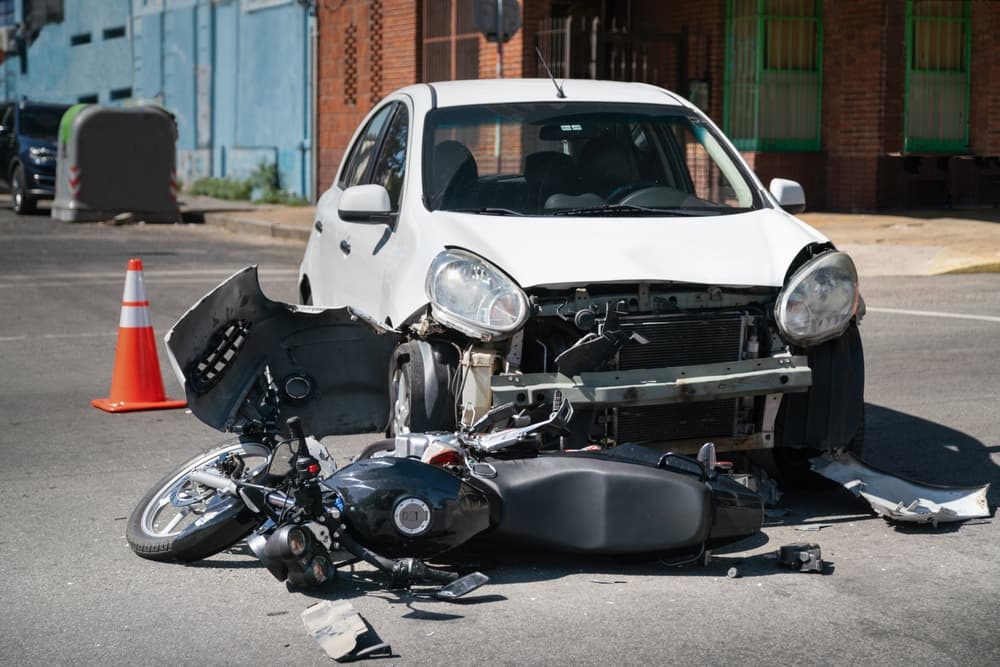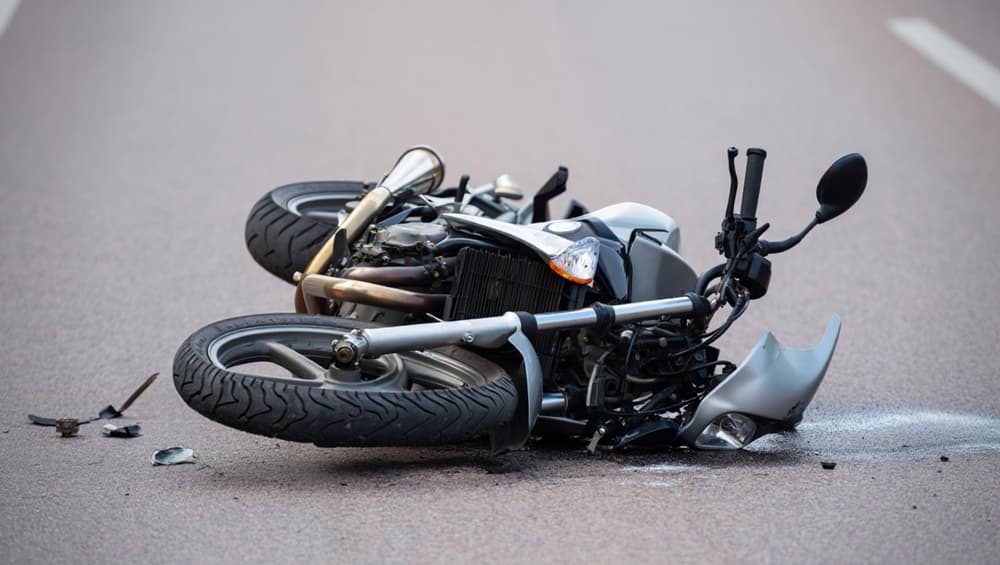According to the most recent data from the National Highway Traffic Safety Administration (NHTSA), motorcyclists are nearly 28 times more likely to die in a crash per vehicle mile traveled than occupants of passenger cars. Surviving such a crash doesn't mean walking away; it means the beginning of a long, painful, and expensive recovery.
But the physical and financial battle is only part of the story.
After a motorcycle accident, you face another, more subtle challenge: the systemic bias against riders. In the eyes of other drivers, police officers, and especially insurance companies, there is an unspoken assumption that the person on the bike must have done something wrong. They may use this bias to deny your claim or pressure you into accepting a settlement that doesn't begin to cover the cost of what you've lost.
This is not a fair fight. You are recovering from devastating injuries while they are incentivized to pay you out as little as possible.
At Abels & Anne, P.C., our motorcycle accident lawyers understand the specific biases riders face because we fight them every single day. If you were injured, let us handle the fight while you focus on healing. Call us at (312) 924-7575 for a free, no-obligation conversation about your rights.
The Reality of Motorcycle Accidents
In an accident, a motorcyclist has none of the protections of a passenger vehicle—no steel frame, no airbags, no seatbelts. The rider's body absorbs the full force of the impact.
Consider these facts:
- A Leading Cause of Traffic Fatalities: In Illinois, even though motorcycles make up just 3% of all registered vehicles, they account for over 15% of all traffic fatalities, according to the Illinois Department of Transportation.
- Head Injuries Remain the Greatest Threat: The NHTSA consistently reports that head injuries are the leading cause of death in motorcycle crashes. Their research shows that helmets are approximately 37% effective in preventing rider deaths and 67% effective in preventing brain injuries.
Proactive Safety and Its Impact on Your Claim

As a rider, you already know that your safety depends on your skill and awareness. Taking proactive steps not only protects you on the road, but also plays a role in protecting your legal rights after a crash.
- Defensive Riding: Graduating from a defensive riding course approved by the Motorcycle Safety Foundation shows a commitment to safety in a legal claim. It establishes you as a trained, responsible operator.
- High-Visibility Gear: Brightly colored jackets, vests, and helmets make you more conspicuous to other drivers. This helps counter the most common and frustrating excuse used by at-fault drivers: "I just didn't see him."
- Motorcycle Maintenance: Keeping your bike in good working order, with proper tires, brakes, and lights, eliminates any argument that a mechanical failure contributed to the crash.
What About Helmets and Illinois Law?
This is a critical point of confusion for many riders. Illinois law (625 ILCS 5/11-1404) does not have a universal helmet requirement for all riders. If you are over 18, you are not legally required to wear one.
Insurance companies may try to use this against you. If you weren't wearing a helmet, their adjusters will argue that you were "comparatively negligent" and that your own actions contributed to the severity of your head injury, justifying reducing or denying your compensation.
The core issue in a lawsuit is what caused the crash, not what made the injuries worse. While a helmet can reduce injuries, the absence of one did not cause a distracted driver to run a red light or turn left into your path. Our job is to keep the focus squarely on the negligence of the at-fault driver who caused the accident in the first place.
From Statistics to Scars: The Human Cost of a Crash

Surviving a motorcycle accident is the beginning of a new reality. The injuries are rarely minor and, in some cases, rewrite every aspect of your life—your ability to work, to care for your family, and to simply live without pain.
At our firm, we handle cases involving the most severe injuries riders face:
- Traumatic Brain Injuries (TBI): An impact to the head can cause injuries ranging from a concussion to a permanent, life-altering traumatic brain injury. Symptoms from these injuries are subtle masters of deception, appearing days or weeks later and affecting memory, concentration, and personality.
- Spinal Cord Injuries: Because a rider is typically thrown from their bike, spinal cord damage is almost always unavoidable. These injuries frequently result in chronic pain, partial paralysis (paraplegia), or total paralysis (quadriplegia), requiring a lifetime of medical care, as explained by the National Institute of Neurological Disorders and Stroke.
- Road Rash and Degloving Injuries: Severe road rash strips away multiple layers of skin, requiring skin grafts and leaving permanent scarring. In a degloving injury, skin and tissue are ripped away from the underlying muscle and bone, creating a high risk for infection and a need for complex reconstructive surgery.
- Internal Injuries: The blunt force trauma of hitting the pavement or another vehicle can cause organ damage and internal bleeding.
- Complex Fractures: The force of a crash is usually enough to shatter bones into multiple pieces, particularly in the legs, arms, and pelvis. These "comminuted fractures" can require multiple surgeries, the insertion of rods and plates, and may lead to permanent mobility issues or amputation.
Challenges of the Insurance Claim Process & the Bias Riders Face
After an accident, the claim investigation begins. From a business perspective, an insurance company has a duty to its shareholders to manage costs, which involves a thorough evaluation of every claim. In motorcycle cases, this evaluation is particularly detailed due to common, though often inaccurate, perceptions about riders and risk.
While the most frequent cause of these accidents is another driver violating the motorcyclist's right-of-way, the investigation will always include a detailed review of the rider's actions as well.
You can expect the claim investigation to include the following elements:
- The "Visibility" Question: The other driver will often state, "I looked, but I never saw them." From a legal standpoint, this statement raises an important question: was the motorcycle there to be seen by a reasonably careful driver? Our role is to use evidence from the scene and witness statements to demonstrate that the motorcycle made reasonable efforts to be visible. “Not seeing” is not an excuse, but rather a tell-tale sign that the driver was negligent—they should have seen the rider, but didn’t.
- Analysis of Speed and Action: The severe damage and injuries common in a motorcycle accident can lead an adjuster to question the rider's speed, regardless of other evidence. A thorough claim requires an objective analysis of the facts that rely on accident reconstruction principles, rather than making assumptions based solely on the severity of the outcome.
- A Request for a Recorded Statement: An adjuster will likely call and ask for a recorded statement to get your account of the accident. This is a standard step in their process. However, it's important to approach this with caution. The questions can be highly specific, and your answers, given without legal preparation, may be misinterpreted or used to assign partial fault later in the process. It is generally advisable to have legal counsel manage these formal communications.
- Early Settlement Offers: It is not uncommon to receive a settlement offer relatively early in the process. These offers do provide quick financial relief at a time of stress. The risk, however, is that they are typically made before the full extent of your injuries—and your need for future medical care—is fully known. Accepting an early settlement always requires you to sign a release, which is a legal document that permanently closes your claim to any future compensation. It's important to have a complete understanding of the long-term value of your claim before making that final decision.
What a Motorcycle Accident Claim Can Recover for You

A personal injury claim does more than just pay for your current bills. It allows you to secure the financial resources needed to account for everything the accident took from you—past, present, and future. The law aims to make you "whole" again by forcing the at-fault party's insurer to cover every single loss stemming from their negligence.
We fight to recover the maximum compensation available for:
Economic Damages (The Tangible Costs)
This is the foundation of your claim, where we document every dollar the accident has cost you.
- All Medical Bills: From the ambulance and emergency room to future surgeries, physical therapy, medication, and even home modifications.
- All Lost Wages: The income you have already lost while unable to work.
- Diminished Earning Capacity: If your injuries prevent you from returning to your old job or limit your ability to work, this compensates you for that lifetime of lost future income.
Non-Economic Damages (The Human Cost)
Some losses don't come with a price tag, but they are just as real.
- Pain and Suffering: For the physical pain your injuries have caused and will continue to cause.
- Emotional Distress: For the anxiety, PTSD, and trauma that are the invisible scars of a serious accident.
- Loss of a Normal Life: Compensation for the way the injury has rewritten your life, taking away your ability to enjoy hobbies, play with your children, or engage in daily activities.
- Disfigurement: For the permanent scarring or amputation that serves as a constant reminder of the crash.
Why Acting Quickly Is About More Than the Legal Deadline
In Illinois, you generally have two years from the date of an accident to file a personal injury lawsuit. This is the statute of limitations. However, the practical deadline for building a strong case is much shorter.
Evidence in a motorcycle accident is unique and fragile. It disappears within days, or even hours.
- The Scene Vanishes: Scrape marks, fluid stains, and gouges on the pavement that show the bike's trajectory and the point of impact are quickly worn away by traffic and weather.
- Your Gear is Critical Evidence: The condition of your helmet, jacket, and boots provides a powerful story about the forces of the impact. This evidence is often lost, stored improperly, or thrown away, destroying its value.
- The Motorcycle is a Witness: The specific damage to your bike can prove the angle of impact and the other vehicle's speed. Bikes are often towed to yards and are sometimes repaired or scrapped before a proper inspection can be done, destroying crucial evidence.
- Witness Memories Fade: The memories of people who saw the crash are most accurate in the hours and days immediately following. Waiting allows their memories to fade or become confused.
The sooner we are involved, the sooner we can dispatch our own investigators to photograph the scene, inspect the vehicles, preserve your gear, and lock in witness testimony. This early, aggressive action is the key to proving fault and winning your case.
Frequently Asked Questions About Chicago Motorcycle Accidents
Can I still have a case if I wasn't wearing a helmet in Illinois?
Yes. Because Illinois does not have a universal helmet law for adults, not wearing one does not prohibit you from filing a claim. The defense will almost certainly try to argue you were partially at fault for your head injuries (a legal concept called comparative negligence), but this does not excuse the driver who caused the crash. It is our job to prove their actions, not your choice of gear, caused the accident.
What is the most common cause of motorcycle accidents involving other cars?
The single most common scenario is another vehicle turning left in front of an oncoming motorcyclist. These "failure to yield" situations are incredibly dangerous because the car driver violates the rider's right-of-way. The most frequent excuse given is that they "didn't see" the motorcycle, which is an admission of inattentive driving.
How much is my motorcycle accident case worth?
There is no set amount or average settlement. The value of your case depends entirely on the specific facts: the severity of your injuries, the total cost of your past and future medical care, the amount of your lost income, and the long-term impact on your quality of life. We meticulously document these damages to ensure we are pursuing the absolute maximum compensation available under the law.
The police report blames me for the accident. Do I still have a case?
Possibly, yes. A police report is an officer's initial opinion; it is not the final word on legal fault. Officers arrive after the fact, reports can contain errors, and they may be based on the biased statement of the other driver. We conduct our own independent investigation, hiring accident reconstruction experts, and have frequently won cases despite starting with an unfavorable initial police report.
Take the First Step. Let Us Handle the Rest.

Rebuilding your life after a serious motorcycle accident is a marathon, not a sprint. It requires all of your energy and focus. You cannot be expected to also fight a legal battle against a powerful insurance company trained to defeat you.
That is our job.
Let us take the burden of the legal fight off your shoulders. Let us handle the adjusters, the investigators, and the paperwork. Your focus should be on your recovery. Our focus will be on securing the justice and financial stability you need to move forward.
Contact the Chicago personal injury lawyers at Abels & Anne, P.C. today. The consultation is free and confidential. Call us at (312) 924-7575.
